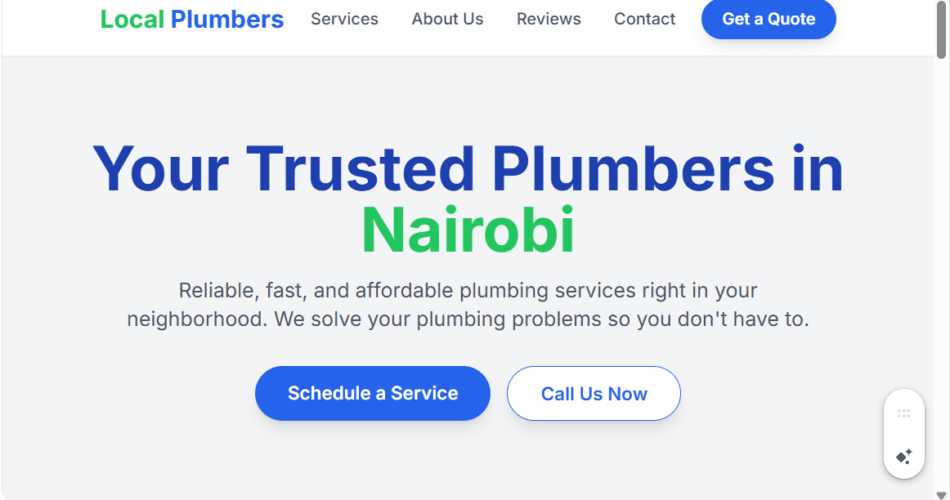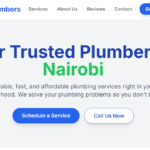SEO for Hyperlocal Businesses in Kenya
- Delivery Time2 Weeks
- English levelProfessional
- LocationUSA, United Kingdom, United Arab Emirates, New York, Nairobi, Kilimani, Kenya, Dubai, CBD Nairobi, Canada, Australia
Service Description
The cost of SEO for Hyperlocal Businesses in Kenya is 80000KES per month.Get SEO for Hyperlocal Businesses in Kenya at a price of 30000KES per month at Black Shepherd Technologies.Boost your Kenyan business with hyperlocal SEO. Learn how to rank higher on Google Maps & local search results in Nairobi, Mombasa, and beyond. We cover GMB, local keywords, and content strategies to attract local customers and grow your brand.
In today’s competitive digital landscape, a strong online presence is crucial for businesses of all sizes. For hyperlocal businesses in Kenya, however, this need is even more pronounced. Hyperlocal businesses, which serve a specific geographic area like a neighborhood, town, or city, rely heavily on connecting with customers in their immediate vicinity. This is where a well-executed hyperlocal SEO strategy becomes a game-changer, acting as a powerful tool to drive visibility, foot traffic, and sales.
What is Hyperlocal SEO?
Hyperlocal SEO is a specialized approach to Search Engine Optimization that focuses on attracting customers within a very specific, limited geographical radius. Unlike traditional SEO, which aims for broader keyword rankings, hyperlocal SEO prioritizes long-tail, location-based keywords and leverages tools like Google Business Profile to appear prominently in “near me” searches and local map results. The goal is to make a business the most visible and trusted option for local customers actively looking for a product or service.
Why is Hyperlocal SEO Critical for Kenyan Businesses?
Kenya’s digital ecosystem is unique and presents a fertile ground for hyperlocal businesses to flourish. With a high mobile phone penetration rate and a growing number of Kenyans using their smartphones to search for goods and services, the potential for local businesses to thrive online is immense. A well-optimized hyperlocal SEO strategy can:
Increase Visibility and Attract Targeted Traffic: By optimizing for location-specific keywords such as “best restaurant in Nairobi” or “plumber in Mombasa,” a business can ensure it appears in front of the right audience at the right time. This is high-intent traffic, meaning customers are often ready to make a purchase, leading to higher conversion rates.
Level the Playing Field: Hyperlocal SEO allows small and medium-sized enterprises (SMEs) to compete effectively with larger, more established brands by dominating search results within their specific service area.
Build Trust and Credibility: Appearing consistently in local search results and having a well-maintained online presence builds trust with potential customers. Positive reviews and a complete Google Business Profile signal to both search engines and users that the business is reputable and reliable.
Drive Foot Traffic and Sales: For businesses with a physical storefront, such as a restaurant, retail shop, or salon, hyperlocal SEO directly translates to more walk-in customers.
Cost-Effective Marketing: Compared to traditional advertising, hyperlocal SEO offers a high return on investment (ROI) by targeting an audience already interested in the business’s offerings.
Key Pillars of a Successful Hyperlocal SEO Strategy in Kenya
A comprehensive hyperlocal SEO strategy for a Kenyan business should be built on several core components:
1. Google Business Profile (GBP) Optimization:
This is the cornerstone of any hyperlocal SEO strategy. A GBP is a free tool that allows businesses to manage how they appear on Google Search and Maps. To maximize its impact, a business must:
Claim and Verify: Ensure the business is claimed and verified.
Complete Information: Fill in all details accurately and completely, including the business name, address, phone number (NAP), website, business hours, and category.
High-Quality Photos: Upload high-resolution photos of the storefront, products, services, and team. Kenyans appreciate seeing what they can expect before visiting.
Utilize Google Posts: Use Google Posts to share updates, promotions, events, and special offers. This keeps the profile active and engaging.
Encourage and Respond to Reviews: Actively ask satisfied customers for reviews. Respond to all reviews, both positive and negative, to show that customer feedback is valued. Reviews are a crucial ranking factor and a powerful form of social proof.
2. Localized Keyword Research and Content Strategy:
Understanding how local Kenyans search is vital. A successful strategy goes beyond general keywords and incorporates location-specific terms, and even local language nuances.
Target Location-Based Keywords: Research and integrate keywords like “[service] in Nairobi CBD,” “ in Westlands,” or “plumber in Karen.”
Incorporate Local Language: Where appropriate, use Swahili or Sheng terms that resonate with the local audience. For instance, “ bei poa” (good price) might be a popular search query.
Create Localized Content: Develop content that speaks directly to the local community. This could include blog posts about local events, guides to nearby landmarks, or case studies of local customers. This content establishes the business as a local authority and provides valuable, relevant information to the target audience.
3. Building Local Citations and Backlinks:
Consistent NAP: Ensure the business name, address, and phone number are consistent across all online platforms, including the website, social media profiles, and online directories. Inconsistent information can confuse search engines and harm rankings.
List in Local Directories: List the business in reputable Kenyan directories and listings such as Yellow Pages Kenya, BusinessList.co.ke, or other industry-specific directories.
Local Backlinks: Secure backlinks from other relevant, high-quality local websites, such as local news outlets, bloggers, or community organizations. Sponsoring a local event or collaborating with a local influencer can be an excellent way to earn these valuable links.
4. Technical SEO and Mobile Optimization:
With a majority of Kenyans accessing the internet via mobile devices, a mobile-first approach is non-negotiable.
Mobile-Friendly Website: The website must be responsive, fast, and easy to navigate on a smartphone.
Page Speed: Optimize the website for fast loading speeds, especially in areas with slower internet connections. This includes compressing images and minimizing code.
Schema Markup: Implement local business schema markup to help search engines better understand the business’s name, address, phone number, and other key details.
5. Social Media and Community Engagement:
While not a direct ranking factor, social media engagement can significantly support a hyperlocal SEO strategy.
Engage with the Community: Use platforms like Facebook and WhatsApp, which are hugely popular in Kenya, to connect with the local audience.
Share Local Content: Share blog posts and updates from the website, using location tags to increase visibility.
Encourage Check-ins: For physical locations, encourage customers to check in on social media.
In conclusion, for any hyperlocal business in Kenya aiming to grow, a strategic and deliberate approach to SEO is essential. By focusing on optimizing their Google Business Profile, creating localized content, building local citations, and ensuring a seamless mobile experience, these businesses can connect with their community, build a strong online presence, and ultimately, drive sustainable growth in a highly competitive market.








